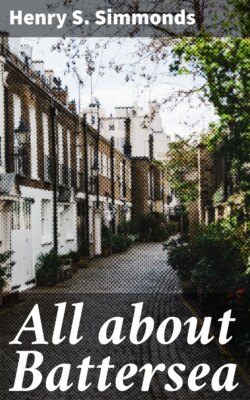Читать книгу All about Battersea - Henry S. Simmonds - Страница 4
На сайте Литреса книга снята с продажи.
Оглавление[1] The inhabitants of ancient Britain derived their origin partly from an original colony of Celtæ, partly from a mixed body of Gauls and Germans. None of them cultivated the ground; they all lived by raising cattle and hunting. Their dress consisted of skins, their habitations were huts of wicker-work covered with rushes. Their Priests the Druids together with the sacred women, exercised a kind of authority over them.
Britain according to Aristotle, was the name which the Romans gave to Modern England and Scotland. This appellation is, perhaps derived from the old word brit, partly coloured, it having been customary with the inhabitants to paint their bodies.
According to the testimony of Pliny and Aristotle, the Island in remotest times bore the name of Albion.
The Sea by which Britain is surrounded, was generally called, the Western, the Atlantic, or Hesperian Ocean. Herodotus informs us that the Phœnicians, Greeks, and Carthaginians, especially the first were acquainted with it from the earliest period and obtained tin there and designated it Tin Island. The name Great Britain was applied to England and Scotland after James I. ascended the English throne in 1603. England and Scotland however had separate Parliaments till 1st of May 1707, when during the reign of Queen Anne the Island was designated by the name of the United Kingdom of Great Britain. The terms at first excited the utmost dissatisfaction; but the progress of time has shown it to be the greatest blessing that either nation could have experienced.
[2] The Manor is thus described in Doomsday-book among the lands belonging to the Abbot of Westminster:—"St. Peter of Westminster holds Patricesy, Earl Harold held it; and it was then assessed at 72 hides: now at 18 hides. The arable land is—Three carucates are in demesne; and there are forty-five villians, and sixteen bordars with fourteen carucates, there are eight bond men: and seven mills at £42 9s. 8d. and a corn rent of the same amount, and eighty-two acres of meadow and a wood yielding fifty swine for pannage. There is in Southwark one bordar belonging to the Manor paying twelve pence. From the roll of Wendelesorde (Wandsworth) is received the sum of £6. A villian having ten swine pays to the Lord one; but if he has a smaller number, nothing. One knight holds four hides of this land and the money he pays is included in the preceding estimate. The entire Manor in the time of King Edward was valued at £80, afterwards at £30; and now at £75 9s. 8d.
"King William gave the Manor to St. Peter in exchange for Windsor. The Earl of Moreton holds one and a half hides of land, which in King Edward's time and afterwards belonged to this Manor. Gilbert the Priest holds three hides under the same circumstances. The Bishop of Lisieux had two hides of which the Church of Westminster was seized in the time of William and disseised by the Bishop of Bayeaux. The Abbot of Chertsey holds one hide which the Bailiff of this will, out of ill-will (to the Abbot of Westminster) detached from this Manor, and appropriated it to Chertsey."
Hide of land in the ancient laws of England was such a quantity of land as might be ploughed with one plough within the compass of a year, or as much as would maintain a family; some call it sixty, some eighty, and others one hundred acres. Villian, or Villein, in our ancient customs, denotes a man of Servile or base condition, viz, a bond-man or servant. (Fr. Vilain. L. Villanus, from Villa, a farm, a feudal tenant of the lowest class.)
